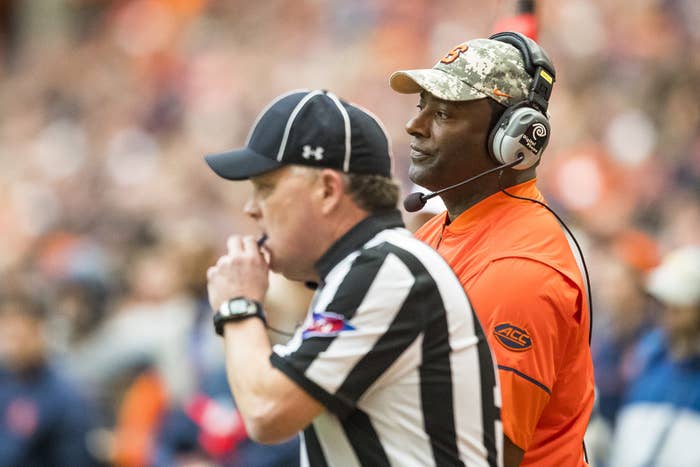
College football teams with Black coaches are penalized more often than teams with coaches who are white, a new study of the highest division teams has found. They are given five to seven extra penalties per season compared to ones with white coaches.
The finding raises new concerns about racism in sports refereeing.
The Social Science Quarterly study released on Sunday held true even adjusting for the quality of the players, coaches, and schools studied. It comes amid rising concern about the dearth of Black coaches at both the professional and college level in football, a sport where 7 out of 10 players in its highest ranks, the NFL, are Black.
“Teams with Black head coaches are more frequently penalized,” said lead author Andrew Davis of North Carolina State University, based on the analysis of all Division I colleges football games from the 2014 to 2019 seasons.
College football teams typically receive 4 to 10 penalties per game, so the effect over a season is not huge. A 12- or 15-game season might have 50 to 150 penalties for a team, which would roughly average to a 5% increase in penalties for teams with Black coaches.
However, penalties are supposed to be given fairly, and football is famously “a game of inches,” the study authors note, where winning or losing can turn on the smallest setback. “Penalties, no matter how many yards they are worth, can disrupt the momentum of a team, kill scoring drives, cost important yardage and downs on defense, and cost teams precious opportunities in close games,” Davis said.
That said, it’s important to note that the study found an association between the two and could not conclusively prove the additional penalties were directly due to the coaches’ race or ethnicity.
Representatives from both the National Collegiate Athletic Association, which runs Division I football, and the National Association of Sports Officials declined to comment on the study after requesting copies of the findings.
In the study, the researchers first looked at both the number of penalties and penalty yards across the 2019 Division I college football season (the highest division), finding more of both given to teams where the head coaches were Black. They then extended the analysis back to 2014, and found that teams with Black coaches typically were given 5.5 more penalties in a 12-game season and nearly 7 more penalties in a 15-game season. (They could not statistically show the penalty yards effect, however, for the longer time period.) The study controlled for other factors in the analysis, such as winning percentage, recruiting quality, US News & World Report rank of the school, whether it had a Black quarterback, coaching experience, and its conference.
If confirmed, the penalties finding wouldn’t be too surprising considering the history of discrimination at US colleges, seen both in sports and in the classroom, Davis said. "Referees, who have a great deal of discretion over what gets called a penalty, and what does not on any given play, may attribute racial stereotypes regarding lack of discipline to teams coached by Black coaches."
In about 40 states, head college football coaches are the highest-paid public employees, with salaries soaring in recent decades. The new study reveals a new dimension to how race might affect coaches in the sport, some experts said.
“I think they provide compelling evidence of differences in the number of penalties per game,” said Texas A&M’s George Cunningham, an expert in sports management. “The results show another form of bias that Black coaches face in the football context, whether in college or professional.”
While the penalty effect is newsworthy, it “does not necessarily mean that race is the cause of the penalties, just that there is a strong relationship between having a Black head coach and receiving more penalties,” said Jeremy Foreman of University of Louisiana at Lafayette, who has done separate research finding Black players were more often penalized in football. That might partly explain the penalty effect found in the study, he suggested, if Black coaches end up recruiting more Black players, who are in turn penalized disproportionately.
However, Eastern Collegiate Football Officials Association Commissioner Milt Halstead told BuzzFeed News that he doubted the penalty effect found by the study was real. “Referees are watching the play on the field, not the coaches,” he said. “That’s where the penalties happen.”
Davis acknowledged that the analysis would be stronger if the timing of the penalties could be measured to see if they came at pivotal moments in the game, perhaps by studying game footage. That could help tell if the added penalties were really affecting game outcomes. The study also turned up a curious finding that teams with higher-quality recruits were more likely to be penalized overall, suggesting that referees might try to “even competition” in games.
Professional football has long been grappling with questions about racism, with players who participated in national anthem protests in 2017 more likely to take a pay cut or be sent to another team. In NFL officiating, some evidence suggests holding penalties are called more often early in games on Black players. The 2021 NFL football season ended with a Black coach, Brian Flores of the Miami Dolphins, charging that racism played a role in his firing. The pro league required all teams to hire at least one woman or person of color as a coach this year, in response to wider concerns about a lack of Black coaches in the pro ranks.
Correction: College football teams average 4 to 10 penalties per game. An earlier version of this post misstated this range.
